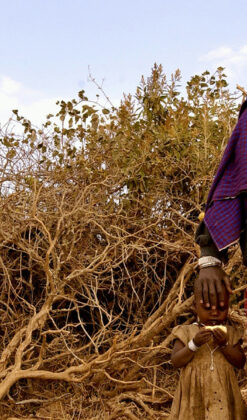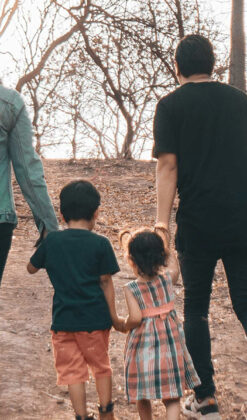By Brandon Stiver. Learn more about Brandon here and get help to transform your orphanage here. This blog post is the second in a four-part series. Read Part One here.
A year after my first short-term mission trip to Africa, I was back. This time I was going to be there for two months as an intern. I went to the orphanage multiple times a week. The kids, smiling ear to ear, would run up to me and my fellow short-termers, jump on us, and play with us. They would sit on our laps and cuddle. It felt like the closest to heaven I had ever been. This calling I was walking towards seemed beyond my wildest dreams.
I had also been donating to this orphanage for a year and a half, giving $100 a month as a college student through their child sponsorship program. As I developed rapport with the leadership, the American missionary who was the on-the-ground orphanage director asked me one day what I wanted to do with my life. I quickly responded that I wanted to move to Tanzania and help kids. She asked me, if a job became available at the orphanage, if I would consider it. Without missing a beat, I said, “That would be my dream job.”
Before the end of that trip, the orphanage’s Executive Director, who was visiting from Southern California, pulled me aside and invited me to join their organization and step into that dream job. The plan was all laid out. After a season of fundraising for the organization, I would return six months later to start working at the orphanage. The plan was for me to start doing the education and business elements of the children’s home; after a few years, I would lead the establishment of their second orphanage to be planted in Masai territory. My calling would then be realized: I would be running an orphanage in Africa. That was my experience. I was in heaven.
The onboarding for my role at the orphanage was… not robust. There was a lot of passion and a whole lot of placing my identity in the role, but not a lot of training. I moved to Tanzania when I was 23 years old and only 18 months out of college. I suppose I was smart enough to figure out some of the education stuff I was running with the kids. There was some training on bookkeeping and doing payroll. I also became the sponsorship manager (yes, I was the one taking the pictures that ended up on your fridge). I was able to figure out the basic details of my work; but other types of training were completely missing.
The orphanage I worked in housed 26 children, and all of them came from various levels of serious adversity. Some had lost a parent; some were HIV+; some had lived on the streets. Abuse, neglect, and relational dysfunction were commonplace in their lives. The assumption that children being in a Christian orphanage would automatically be safe and given a chance to heal is false. At this orphanage, there were absolutely staff that loved them, and they all went to school and had three meals a day. But the staff, including my 20-something self, had no training in how to care for kids who had endured trauma. There was no child protection policy or training. There was no social worker or counselor on staff. What happens when counseling isn’t present? What happens if child protection isn’t promoted? What happens when children persist in orphan status? In far too many cases, trauma lingers, or even increases.
As I’ve worked in orphan care for a decade and a half now, I’ve learned that situations like this are commonplace; in fact, many other orphanages are far worse. This was a “good” orphanage that brought in six figures of American donor funds to care for 26 African kids (a small part of a multi-billion dollar industry). In fact, if you divided the amount of money that came into our American nonprofit by the number of kids in our residential home, we raised over $17k per kid annually. I now have four kids and live in the expensive Seattle area, and I don’t spend anywhere near that much per kid. And yet, the level of care and protection we were able to provide for kids in our orphanage wasn’t sufficient to their needs. But that wasn’t the hardest part.
Just outside the gate to the orphanage compound was a small wooden bench. I walked or drove past it multiple times a day, but I didn’t really give it much thought until I had been living there for a while. The bench was for family visits. Families were not typically welcomed inside the compound, so this bench sat just outside the gate for when the families of “orphans” came by. These families would bring gifts or candies for their children, and they would sit on that bench together. It was a curious thing for me to consider. If these kids had families, and the families wanted to stay connected to their kids, why wasn’t anything being done for the kids to live with them?
Here’s the hard truth. Roughly 80% of the 5.4 million children living in orphanages around the world have one or both of their parents still living. Some kids in orphanages still have both parents and thus aren’t even orphans. Like I shared in my last blog post, the majority of the 140 million orphans in the world are single orphans with one parent still living. Even those kids in orphanages who are double orphans (meaning they have lost both parents) typically still have other known family members in the community. I saw these family members with my own eyes, sitting on a bench and eating store-bought cookies with the children at my orphanage. They were separated from their families, and this separation was facilitated by do-gooders like me who had established institutions in the name of helping.
The results of this type of rearing aren’t good. Studies* show that children who grow up in orphanages are often stunted in their physical growth, suffer mental illness at greater rates, and are more likely to end up in tragic situations like criminality, exploitation, and even suicide later in life. Because child protection is so porous in orphanages, children often suffer abuse, neglect and exploitation within the facility (yes, including the “good” ones). Even interactions I had interpreted as positive—kids running up and jumping on people they hardly knew—was actually evidence of attachment disorders and indiscriminate familiarity. This also put them at greater risk to be taken advantage of. This is their experience. They were not heaven.
But wasn’t I called to be a father to the fatherless? Wouldn’t my presence be the cure these children needed? I had somehow stopped short in my reading of Psalm 68: “A father to the fatherless, a defender of widows, is God in his holy dwelling. God sets the lonely in families.” God sets the lonely in families. He doesn’t put them out on the streets, and He doesn’t place them in orphanages that isolate them from parents and relatives. We’re the ones who allow for that. God sets the lonely in families. Orphanages that pull children away from their families, no matter how good the intentions of the people behind these orphanages, are not God’s solution.
I was not able to be a father to the children in that orphanage. Even the boy I sponsored, who God truly used in my life in tremendous ways, was not meant to be my son. It wasn’t just because some of the youth in that facility were only five or six years younger than me, or because they already had families anyway, or because I didn’t understand Tanzanian adoption law. In the most basic terms, God designed family to be family; putting dozens or even hundreds of kids in a long-term residential facility with hired staff simply isn’t family.
I ended up working at the orphanage for two and a half years. Within that time, I got married to my wife; six months into our marriage, we were expecting. We left the children’s home in 2012, and I took an interim position at a church in California. Later that year, Melissa gave birth to our daughter, Promise. As I held my daughter in the hospital, I experienced something I had never felt before. I felt what it was like to be a father.
We were in the States for a year and a half, but our family knew where we were supposed to be. Could we learn from our time at the children’s home, learn from our experience as parents, and try something else to help children back in Tanzania? What if the solution to children orphaned by AIDS and separated from their communities wasn’t to open up orphanages, but to raise up and support fathers and mothers?
*In this blog, I share some quick stats and general research findings. I encourage you to check out the resources put out by my colleagues at the Faith to Action Initiative if you want to start digging into findings from the studies that I’m referring to. Here’s their link.











